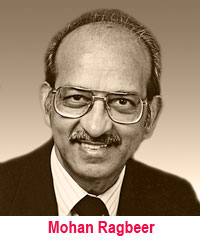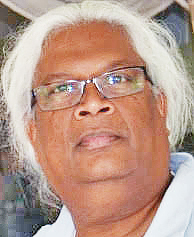Opinions
Cuba lends a hand

This deployment of medical aid has been a feature of the Republic and began in 1960 with aid to Chile, hit by an earthquake. The response has been consistent since, to the Caribbean, and to Africa, including help with the Ebola outbreak in Sierra Leone. It even offered help to the USA following Katrina and Harvey; both were rejected.
One of Cuba's most sustained acts of medical aid has been to Guyana for over forty years, providing medical staff on site, and training doctors and other health workers in Cuba. It is similarly involved with other countries and institutions as request them, including the medical faculties of the University of the West Indies. Most of this activity is through a Cuban Ministry of Health initiative to supply health and other workers e.g. educators, on contract, to as many countries as request them. Contracts are usually for two years, renewable; half of each worker’s earnings is paid to the Cuban government, constituting a major source of foreign exchange. The scheme is generally praised, although not flawless, but most participants benefit from it.
Besides Guyana, Trinidad and Jamaica have large contingents of Cuban health workers, including teaching hospital specialists. It is no secret that their pay in Cuba is small; these contracts are thus highly attractive, and benefit all parties. For example, in 2015, Cuban Health Minister, Roberto Morales, disclosed that there were 50,000 doctors in over 66 countries, a massive deployment, earning for the government $US8.2B, according to the official newspaper Granma.
There is no question that Cuban medicine has earned its worth. In my time in Jamaica as Medical faculty Dean, I studied aspects of their health care and medical education. The models were good, affordable, and suitable for small countries, the ex-colonies, then being set adrift on economic high seas with frail paddles, and then seeing their paddles wrecked by the US, using economic weapons to enforce its political views, and by the doctrine of regime change. The trade embargo has lasted over 55 years, and, instead of acquiring more understanding and political maturity, the US has become more narrow-minded, less tolerant of dissent, and punishes all who disagree. Even at the UN, its representative hawks this arrogance and uses half-truths and threats, not argument, facts or persuasive diplomacy. Why should a wealthy nation not co-exist with poorer ones, regardless of ideology. Must the entire world be chained to bigmacs and mindless obesity?
So far in 60 years of enquiry, no one has offered a good reason why US capitalism cannot co-exist with socialism, be free from bullying and missile exchanges. I have instead gotten from individuals – authorities and ignoramuses (many populating blogs on international relations) – whatever the US propaganda machine can pump out. Most criticise Cuba, North Korea, Venezuela, for not being democratic, no elections, no personal freedom, dictatorship, etc. But what is Trump if not a dictator? And there’s Communist China, beating all at the game of capitalism!
There is no proof that any NATO member is a true democracy, just, or have untainted elections, or will help a poor wise citizen to contest high elected office. Which “democracy” is not ruled by corruption. Where is the nation that has punished those who stole billions from the public – e.g. 2007-9 financial crash, subprime mortgages, politician enrichment, Ponzi schemes, pharmaceutical corruption (e.g. oxycontin) and other corporate heists? I can go on to show how corrupt the world is, so corrupt that small minds, even educated minds, are so brain-washed as to believe that corruption is the standard way of life.
Who can blame the average Cuban for wanting to defect, when hearsay persuades him that America is a place replete with gold and plenty, there for the asking? How many of these poor folk can find a way to get these goodies, if and when they do get there? There are scores of thousands of Cuban prisoners in US jails, some supplying free labour to US corporations.
After paying some attention to its own battered states, the US began sending some aid to the ravaged islands, but not Cuba, while wallowing in sympathy and regrets for its Gulf states, while the poor of Cuba bravely soldier on, their economy devastated by sanctions that deprive them even of life-saving spare parts to diagnostic equipment they acquired from US sources long ago.
A chore itself heading into
'The Coconut'
 Romeo Kaseram
Romeo Kaseram
Ma decided we needed new brooms, which meant heading out into the hot sun, among biting sand-flies, prickly bramble, and uneven, stony ground to the wooded place we called, “The Coconut”. Her announcement, as it always was with any intention to do strenuous work, was met with groans from my uncles, this accompanied with glares in my direction as I jumped out of the hammock ready and able with youthful enthusiasm, excited to head out on any adventure that took us past the sugar canes and deep into the gentle roll of the distant hills.
So it was, growing up then back home among my uncles, who as adolescents were certainly taking me down the wrong road to becoming an adult in what, as we well know today, has turned out to be a conflicted and troubled world. Such was it, with their unkempt scraggly beards, long, half-matted and thick heads of hair, and distant emulation in laughable, imitative accents of the foreign voices singing songs and making dissonant music on the radio glorifying the anti-establishment, that inaccessible, foreign hippy world they longed for whiling away their youth swinging idly, to and fro, fro and to, in their individual hammocks under the mango tree in what was our faraway, rural space.
So it was the way of their world then, which was to avoid any chore that made the home a better place, which was in fact a touchstone to showing them a way to improving their lives, and by emulation, teaching me values of industry and hard work. It took my dear, overworked Ma to teach me the virtues of honest toil meant ignoring the ticklish sweat beading down the forehead and the side of the face, not only through this good example, but through the negativity of lessons she imparted on, “These own-way and harden sons!”, as she constantly reminded them their way in this world was not a wholesome “Resist the establishment, man!” as they chorused in descending baritones, but unadulterated laziness, which with her finish of “Pure and simple!” became her eternal words for summing up a distillation of all of life’s experiences, which she balled into reductionist but essentialist expectorate, and then illustrated with metronomic wagging of her instructive, crooked forefinger, this a royal seal issued from her lips followed by a perfunctory discharge of exasperation, “Chut, man!”
Nothing deterred my uncles, who with theatrical groans, suddenly discovered vital body parts to be malfunctioning, whereby they promptly acquired debilitating limps, contorted faces, and eyes tightly shut so to better endure the shooting, excruciating pains coursing down legs, up arms, stiffening fingers with cramps, and balls of nerves tightening inside skulls to become implacable, malevolent migraines. Sometimes it came down to diversions as lowly as a sudden and inexplicable “belly-wuk”, and with this a forced-march, seen in a soldier heavily-weighted down with baggage and weaponry, only this time the arms and ammunition being taken to the trenches was an armful of well-worn, dogged-eared, and thoroughly already-read comic books.
The thought did not get pass me, despite my tender years, that it took more energy out of my uncles to avoid work, that what they would have consumed in the long haul it took to “The Coconut”, loaded with sharp knives for shaving clean the long spines off the coconut leaves, and well-honed cutlasses for chopping off the branches, these lengthy as oars growing on the stately columns of trees, appearing as they did from the distance to be similar in lankiness to two growing adolescent young men, who as my two uncles did from morning to noon, then noon to night, stood eerily in one spot for hours chewing on the soft stems of plants, casting long, unmoving shadows on the dusty, dry ground as the sun chased the day overhead, the tops of their heads untidy and fibrous, similar to the mops of unkempt hair crowning the distant, beckoning coconut trees.
It was a miracle-mix of promises, cajoling, and threats from Ma, but we returned home with cocoyea brooms, those hundreds of the flexible spines shorn of its green of leaves making up the compound coconut branches. Each broom was bound together with a strip of cloth torn from one of Ma’s old dresses. Making up part of the largesse of the trip into “The Coconut” were also a few bags of dried coconuts, fallen and waiting for Ma to gather for oil.
The day would end with a treat, with Ma chopping open a few coconuts, searching for the core of sprouting nuts, a ball of white flesh sugared by the very icing-hands of the gods. It was a treat, biting into this confection of germination, seeking out the sugar from this refreshing, edible sponge. For her sons, the apple of her eyes, Ma made sugar-cake, grating each coconut by hand before reducing it to a caramelised mix of sugar syrup heady with cinnamon. Even as she slaved over the fire, my uncles rocked away their youth, awaiting Ma’s approach, bringing her offering of steaming sugar-cakes to the altars of their hammocks.
